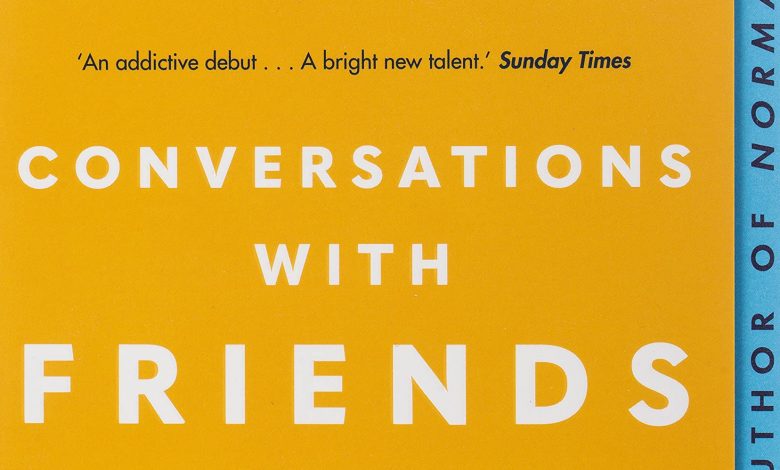The Overthinker’s Anthem: Sally Rooney’s Conversations with Friends

The Overthinker’s Anthem: Sally Rooney’s Conversations with Friends
Cindy Tran ’25 / Emertainment Monthly Staff Writer
Sally Rooney’s writing is known to be stylistically controversial. And for good reason. Her precise word choice can come across as blunt and bland to those who haven’t attempted to read between the lines, and her morally gray characters (at best) can come across as insensitive and prickly. That said, Fans of Rooney’s work soon realize that they get so much more out of her stories if they don’t take what she’s putting on the paper at face value alone.
Many common critiques of Rooney’s writing focus on her characters being unbelievably terrible—that these people are judgmental and irrational and unlikeable in every sense of the words. But their wickedness isn’t simply the merciless kind of evil that you find in Disney villains. They tiptoe the fine line of moral grayness that has readers questioning everything they’ve ever known about human morality. Digging deep and trying to see these characters as if they were yourself can help you not only understand them more but also resonate with them on a deeper level. Put yourself in their shoes, and you will find that in their inherent moral grayness is a song that rings true even to your own ears.

Of Rooney’s work, Conversations with Friends (2017) in particular does an exceptional job of putting into words what an overthinker experiences on a daily basis. This book follows two friends, Frances and Bobbi, as their poetry performances connect them with an acclaimed writer and photographer named Melissa and her trophy husband Nick. This story, at its most basic level, is about the complexities of relationships, the notion of “good” people and “bad” ones, and the difficulties of life as a directionless twenty-something.
Frances’s struggle with her identity and coping with the notion that she may have no “real” personality is something that many people will see in themselves. Who am I besides words on the screen? Who am I besides my follower count? Who am I to the people I know? How am I perceived? How do I perceive myself? Reading this book feels almost uncomfortable at times, because readers may find that Frances is a mirror of themselves. In certain moments, it can seem like you are watching her demise as if it were your own.
Frances’s dependence on external validation and her willingness to comply with whatever makes others happy becomes apparent after repeated instances. Many readers may resonate with this feeling as well. Maybe you place too much value on the way people perceive you or your work. Or, maybe you don’t feel like you’ve truly accomplished something unless someone compliments you or gives you an award for it. At one point, Frances even acknowledges this blatant flaw of hers, saying “My ego had always been an issue. I knew that intellectual attainment was morally neutral at best, but when bad things happened to me I made myself feel better by thinking about how smart I was.”
Her constant self-hatred, which targets everything from her physical appearance to her own self-evaluated lack of personality, is difficult to witness. At some points it borders on unbearable as the readers watch Frances spiral throughout pages upon pages of nervous introspection about the way people interpret her actions: “I realized my life would be full of mundane physical suffering, and that there was nothing special about it. Suffering wouldn’t make me special, and pretending not to suffer wouldn’t make me special.” In these moments, it can feel like the readers are watching a car fly off a cliff—the driver has lost control of the steering wheel and all the readers can do is watch the fall with bated breath.
That is not to say that Frances is the only character with complex insides. Bobbi, Melissa, and Nick hold equally questionable beliefs. For example, Bobbi is frequently cruel and manipulative in her conversations with Frances. Once, she even tells Frances “You underestimate your own power so you don’t have to blame yourself for treating other people badly.” Melissa and Nick are equally and intolerably enabling in the way they accept Bobbi’s relentless criticism of everything Frances does. Jealousy is a resounding beat in the shaky bridge of friendship that Bobbi and Frances uphold. Sometimes they are able to cross the bridge—and other times, it breaks apart before they are able to meet in the middle. Rooney’s ability to write the tension between the four main characters accurately depicts the ups and downs of relationships—not only romantic ones but also paternal and platonic ones as well.
In true Rooney fashion, there are quite a few loose ends that are not tied up by the last page. Some readers may hate that, but others may love the way she leaves room for the audience to make their own interpretations about the paths of their favorite characters beyond their final appearance. There is a sense of comfort in knowing that the end is not really the end, and that these characters can live on in your head for as long as you need their company.
Sally Rooney’s most recent book, Beautiful World, Where Are You, came out on September seventh. Here’s to hoping it lives up to the powerful example she set with her debut novel.